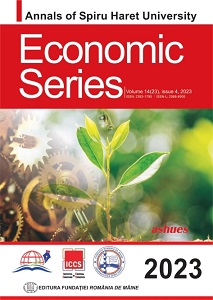Effect of Financial Stability on Nigerian Economic Growth: An Empirical Investigation
Effect of Financial Stability on Nigerian Economic Growth: An Empirical Investigation
Author(s): Godwin Emmanuel Oyedokun, Babatunde OrenugaSubject(s): National Economy, Economic development, Financial Markets
Published by: Editura Fundaţiei România de Mâine
Keywords: Economic growth; Financial stability; Non-performing loan; Return on asset;
Summary/Abstract: Economic growth is one of the most extensively alluded economic indicators. This study focused on the effect of financial stability on economic growth of Nigeria. An ex-post facto research design was adopted for the study. The study adopted secondary data. Annual reports data gathered on Return on assets and non-performing loans of eight (8) banks with international authorization to represent all deposit money banks in Nigeria covering the period of 2002 to 2021. Purposive sampling was employed to choose data from Nigeria. Annual data covering the entire study period was collected and analyzed using the E-Views 9 statistical package. Findings revealed that Return on asset (ROA) has a negative relationship with Nigerian economic growth and the effect is statistically significant (ꞵ= -0.051184; P-Value = 0.0390). Non-performing loan (NPL) has a negative correlation with Nigerian economic growth and the effect is statistically insignificant (ꞵ= -0.016001; P-Value =0.4983). The study concluded that financial stability when managed appropriately hold potential to enhancing Nigerian economic growth. Based on the findings, the study recommended that government should establish a steady exchange rate regime capable of encouraging capital inflows into the country and boost Nigeria’s financial stability. In addition, the current efforts designed at checkmating loan defaults in the banking system through the application of the global standing instruction (GSI) regulations should be improved upon, sustained, and extended to non-individual customers of financial institutions. Furthermore, the cash reserve requirements (CRR) should be reduced to give room for more resources for lending to investors where banks could also make more profits. The current high lending rates in the banking industry are unfavorable to support the real sector economy and, therefore, incapable of motivating economic growth, therefore, the CBN should reduce monetary policy rate (MPR).
Journal: Annals of Spiru Haret University. Economic Series
- Issue Year: 23/2023
- Issue No: 4
- Page Range: 588-607
- Page Count: 20
- Language: English

